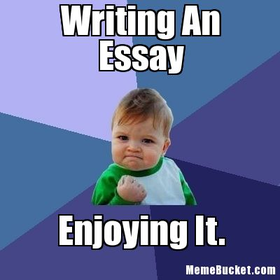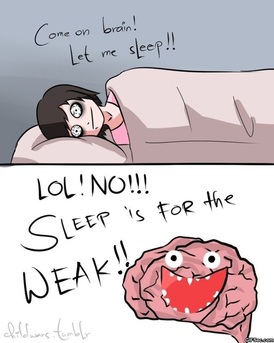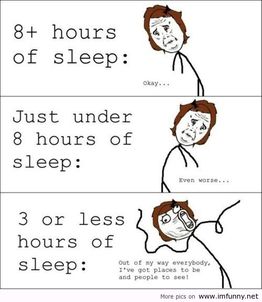Last year I published, “The 5 Cardinal Sins of Essay Writing,” which is my most-viewed post to date. In it I covered the common writing errors students make that drive their instructors bananas.
And here’s why: we tend to repeat these mistakes over and over, despite being told when and how to avoid them.
It got me thinking, maybe it’s time to return to the topic in a more nuanced way.
So let’s start with my favorite fatal essay error: Filler.
And here’s why: we tend to repeat these mistakes over and over, despite being told when and how to avoid them.
It got me thinking, maybe it’s time to return to the topic in a more nuanced way.
So let’s start with my favorite fatal essay error: Filler.
What is it?
Filler (or fluff) is the rhetorical padding we tend to use for one or more of the following reasons:
Filler (or fluff) is the rhetorical padding we tend to use for one or more of the following reasons:
- You need to fill up more space and bump up your word count
- You don’t know how to write a strong introduction or conclusion
- You don’t understand the topic well enough to go into specifics
- You didn’t do enough research and are trying to gloss over the points you aren’t prepared to address
- You left the paper until the last minute and just want to get it done
- You think your instructor expects you to use flowery, ornate language and syntax
- You rely on clichéd language to make a point
What are some examples of filler?
You are assigned an essay on the causes of World War I and you lead off with this:
Throughout all space and time, humans have gone to war. They fought over land, power, religion, money, people, and other things. In the Thirty Years’ War in the 1600s, people started fighting over religion, but it was also about land. Then in the 1800s the Napoleonic Wars were also about capturing lots of land and gaining power. People were used to war as a way of life and leaders used fighting to win more territory and power. So it was with World War I – people in charge wanted more power and land, among other things.
Now let’s break down why if I were marking your paper, I’d consider this paragraph one big fluffball.
You are assigned an essay on the causes of World War I and you lead off with this:
Throughout all space and time, humans have gone to war. They fought over land, power, religion, money, people, and other things. In the Thirty Years’ War in the 1600s, people started fighting over religion, but it was also about land. Then in the 1800s the Napoleonic Wars were also about capturing lots of land and gaining power. People were used to war as a way of life and leaders used fighting to win more territory and power. So it was with World War I – people in charge wanted more power and land, among other things.
Now let’s break down why if I were marking your paper, I’d consider this paragraph one big fluffball.
- Throughout all space and time is a cliché. A cliché is an overused word or phrase that becomes devoid of meaning or original thought. When you stick it in your writing, it’s a crutch. Catch yourself when you use clichéd language and ask yourself what you really mean. Then find an original way to say that.
- “Other things” – m’kay, what other things?
- Going into previous wars could be relevant if you were building an argument about how World War I was contingent on events that happened centuries before. But in this case, it reads like you are trying to fill up space to get through the paragraph.
- Repetitive wording and points: it’s a valid point that war is motivated by power, money, religion, and grabs for territory. So say it once and then it’s been said. But writing the same thing over and over just looks like you are trying to up your word count without actually offering any new information or arguments.
- Crashing into the last sentence – finally, you are addressing the essay topic. But you don’t get to it until the end of the paragraph. A strong introduction gets to the point immediately, provides a roadmap for the reader for where your discussion is going, offers some context for the debate, and explicitly states your argument.
Beware the Rhetorical Flair
I once graded an essay in which a student meticulously crafted what I’m sure he thought was an evocative and powerful metaphor for revolutions, describing how water surges a path through the earth, over rocks, and even through man-made barriers. It was all very nice, but the problem was, he supposed to be talking about the Boxer Rebellion at some point, and he never quite made it around to the topic.
So, essentially, he had devoted an entire paragraph of a short 3 page essay to talking about water. This, people, is filler extremus.
That said, I believe the student thought he was making relevant remarks (namely because he tried to argue with me about his grade).
Here’s what happened: he fell into the trap of relying too heavily on rhetorical flair, instead of focusing on articulating his argument and points clearly and in the simplest terms possible.
Lots of students (myself included) head off to college and think they need to start writing in a fancy, scholarly voice. The problem, of course, is that we have little to no prior experience with what actually constitutes scholarly language, and end up mimicking what we think is elevated speech, not realizing that something said with great flourish isn’t always contributing a substantial point.
For example, your English professor assigns you a persuasive essay topic addressing whether students should be expected to do homework on weekends and alternative studying schedules if not.
You decide to take the position of anti-weekend homework, and type out:
“We need to empower students to take their education into their own hands.”
This, right here, is some rhetorical flair. You used the word “empower” (nice) and turned your point into some kind of rallying cry. It sounds good – really good, in fact. The problem is that it doesn’t actually say anything at all.
What do you mean by empower? Who is the “we” doing the empowering? Are you suggesting students all self-educate? To what degree are you prescribing students all become autodidacts (self-taught learners) – in conjunction with a formal education, or as an alternative to a traditional college setting?
It’s not so much that the sentence itself is a problem. You could very well use it as an introductory sentence, but your subsequent points need to be specific, clear, and precisely worded so that nobody (especially the person grading you) thinks you are glossing over important arguments or trying to hide the fact that you didn’t put much thought into the topic at all.
I once graded an essay in which a student meticulously crafted what I’m sure he thought was an evocative and powerful metaphor for revolutions, describing how water surges a path through the earth, over rocks, and even through man-made barriers. It was all very nice, but the problem was, he supposed to be talking about the Boxer Rebellion at some point, and he never quite made it around to the topic.
So, essentially, he had devoted an entire paragraph of a short 3 page essay to talking about water. This, people, is filler extremus.
That said, I believe the student thought he was making relevant remarks (namely because he tried to argue with me about his grade).
Here’s what happened: he fell into the trap of relying too heavily on rhetorical flair, instead of focusing on articulating his argument and points clearly and in the simplest terms possible.
Lots of students (myself included) head off to college and think they need to start writing in a fancy, scholarly voice. The problem, of course, is that we have little to no prior experience with what actually constitutes scholarly language, and end up mimicking what we think is elevated speech, not realizing that something said with great flourish isn’t always contributing a substantial point.
For example, your English professor assigns you a persuasive essay topic addressing whether students should be expected to do homework on weekends and alternative studying schedules if not.
You decide to take the position of anti-weekend homework, and type out:
“We need to empower students to take their education into their own hands.”
This, right here, is some rhetorical flair. You used the word “empower” (nice) and turned your point into some kind of rallying cry. It sounds good – really good, in fact. The problem is that it doesn’t actually say anything at all.
What do you mean by empower? Who is the “we” doing the empowering? Are you suggesting students all self-educate? To what degree are you prescribing students all become autodidacts (self-taught learners) – in conjunction with a formal education, or as an alternative to a traditional college setting?
It’s not so much that the sentence itself is a problem. You could very well use it as an introductory sentence, but your subsequent points need to be specific, clear, and precisely worded so that nobody (especially the person grading you) thinks you are glossing over important arguments or trying to hide the fact that you didn’t put much thought into the topic at all.
If you find that you are receiving low marks from your instructors due to filler, keep in mind this rule I share with my student clients (over and over):
With time and practice you will become skilled enough to review your work without having to literally dissect your essay word-by-word.
The point is to produce a paper that is cohesive in terms of language, clarity, and organization so that the reader is able to easily discern your thesis, arguments, evidence, and final points without first having to wade through a valley of filler and fluff.
- Make sure every paragraph has a function.
- Make sure every sentence in every paragraph has a function.
- Make sure every word in every sentence in every paragraph has a function.
With time and practice you will become skilled enough to review your work without having to literally dissect your essay word-by-word.
The point is to produce a paper that is cohesive in terms of language, clarity, and organization so that the reader is able to easily discern your thesis, arguments, evidence, and final points without first having to wade through a valley of filler and fluff.











